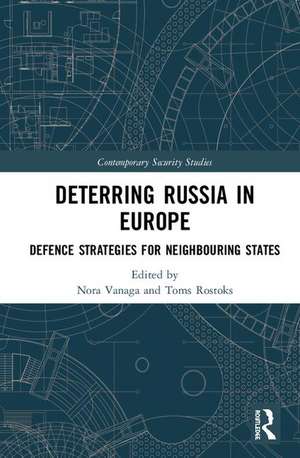Deterring Russia in Europe: Defence Strategies for Neighbouring States: Contemporary Security Studies
Autor Nora Vanagaen Limba Engleză Hardback – 3 oct 2018
Deterrence,afterbeinglargelyabsentfromdebatesamongacademicsandpolicy-makersforalmostaquarterofacentury,hasmadeacomebackinEurope.SinceRussia'sannexationofCrimeaandthestartofthemilitaryconflictinUkraine'sDonbassregion,easternandnorthernEuropeanstateshaverevisedtheirassessmentsofRussia'spoliciesandintentions.TheapproachusedbyRussiainUkrainehasrenderedlessonslearnedfromtheColdWardeterrenceonlypartiallyapplicableduetothechangingsecuritysituationinEurope.Theemergenceofthecyberrealm,asmalleremphasisonnucleardeterrence,andtheideologicalconflictbetweenRussiaandtheWest,areamongthekeydifferencesbetweentheColdWarandthecurrentsecurityenvironment.Structuredintotwoparts,thefirstpartdiscussesconceptualaspectsofdeterrence,whiletheseconddiscussestencountrycasestudies,whichincludebothNATOandnon-NATOcountries.Thisallowsforanin-depthanalysisofthechangingcharacterofdeterrenceanditspracticalapplicationbyRussia'sEuropeanneighbours.
Thisvolumewillbeofmuchinteresttostudentsofstrategicstudies,Europeanpolitics,Russianforeignpolicy,securitystudiesandinternationalrelationsingeneral.
Din seria Contemporary Security Studies
-
 Preț: 312.00 lei
Preț: 312.00 lei -
 Preț: 348.40 lei
Preț: 348.40 lei - 9%
 Preț: 934.96 lei
Preț: 934.96 lei -
 Preț: 287.96 lei
Preț: 287.96 lei - 18%
 Preț: 1222.16 lei
Preț: 1222.16 lei - 18%
 Preț: 1227.03 lei
Preț: 1227.03 lei -
 Preț: 452.35 lei
Preț: 452.35 lei - 18%
 Preț: 1108.42 lei
Preț: 1108.42 lei - 16%
 Preț: 248.97 lei
Preț: 248.97 lei - 18%
 Preț: 1218.89 lei
Preț: 1218.89 lei - 18%
 Preț: 1058.79 lei
Preț: 1058.79 lei -
 Preț: 498.48 lei
Preț: 498.48 lei - 26%
 Preț: 1016.77 lei
Preț: 1016.77 lei - 18%
 Preț: 1062.98 lei
Preț: 1062.98 lei - 18%
 Preț: 1010.05 lei
Preț: 1010.05 lei - 18%
 Preț: 1054.97 lei
Preț: 1054.97 lei -
 Preț: 399.79 lei
Preț: 399.79 lei - 18%
 Preț: 1114.30 lei
Preț: 1114.30 lei - 18%
 Preț: 1113.25 lei
Preț: 1113.25 lei - 18%
 Preț: 1221.26 lei
Preț: 1221.26 lei - 18%
 Preț: 1059.84 lei
Preț: 1059.84 lei - 18%
 Preț: 704.41 lei
Preț: 704.41 lei - 18%
 Preț: 1055.84 lei
Preț: 1055.84 lei - 26%
 Preț: 821.10 lei
Preț: 821.10 lei - 18%
 Preț: 1061.06 lei
Preț: 1061.06 lei - 18%
 Preț: 1229.46 lei
Preț: 1229.46 lei -
 Preț: 385.54 lei
Preț: 385.54 lei - 18%
 Preț: 946.61 lei
Preț: 946.61 lei - 18%
 Preț: 1271.75 lei
Preț: 1271.75 lei - 18%
 Preț: 1057.57 lei
Preț: 1057.57 lei -
 Preț: 416.22 lei
Preț: 416.22 lei -
 Preț: 437.71 lei
Preț: 437.71 lei - 18%
 Preț: 1054.71 lei
Preț: 1054.71 lei -
 Preț: 409.31 lei
Preț: 409.31 lei - 18%
 Preț: 1170.14 lei
Preț: 1170.14 lei - 28%
 Preț: 849.84 lei
Preț: 849.84 lei - 18%
 Preț: 702.40 lei
Preț: 702.40 lei -
 Preț: 414.32 lei
Preț: 414.32 lei - 18%
 Preț: 1059.93 lei
Preț: 1059.93 lei - 18%
 Preț: 1061.93 lei
Preț: 1061.93 lei - 18%
 Preț: 1163.88 lei
Preț: 1163.88 lei - 18%
 Preț: 1002.68 lei
Preț: 1002.68 lei - 18%
 Preț: 694.94 lei
Preț: 694.94 lei - 25%
 Preț: 823.63 lei
Preț: 823.63 lei - 18%
 Preț: 939.79 lei
Preț: 939.79 lei - 18%
 Preț: 1057.89 lei
Preț: 1057.89 lei
Preț: 766.63 lei
Preț vechi: 1028.84 lei
-25% Nou
146.70€ • 156.87$ • 122.31£
Carte tipărită la comandă
Livrare economică 17 aprilie-01 mai
Specificații
ISBN-10: 0815370156
Pagini: 300
Ilustrații: 16 Tables, black and white
Dimensiuni: 156 x 234 x 25 mm
Greutate: 0.59 kg
Ediția:1
Editura: Taylor & Francis
Colecția Routledge
Seria Contemporary Security Studies
Locul publicării:Oxford, United Kingdom
Public țintă
Postgraduate, Professional, and UndergraduateCuprins
Notă biografică
Toms Rostoks is a researcher at the Centre for Security and Strategic Research at the National Defence Academy of Latvia. He is also Associate Professor in international relations at the Department of Political Science, University of Latvia.
Descriere
This edited volume examines deterrence and the defense efforts of European states neighboring Russia, following the Crimean intervention. Deterrence, after being largely absent from debates among academics and policy-makers for almost a quarter of a century, has made a comeback in Europe. Since Russia's annexation of Crimea and the start of the military conflict in Ukraine's Donbass region, eastern and northern European states have revised their assessments of Russia's policies and intentions.
The approach used by Russia in Ukraine has rendered lessons learned from the Cold War deterrence only partially applicable due to the changing security situation in Europe. The emergence of the cyber realm, a smaller emphasis on nuclear deterrence, and the ideological conflict between Russia and the West, are among the key differences between the Cold War and the current security environment. Structured into two parts, the first part discusses conceptual aspects of deterrence, while the second discusses ten country case studies, which include both NATO and non-NATO countries.
This allows for an in-depth analysis of the changing character of deterrence and its practical application by Russia's European neighbours. This volume will be of much interest to students of strategic studies, European politics, Russian foreign policy, security studies and international relations in general.
